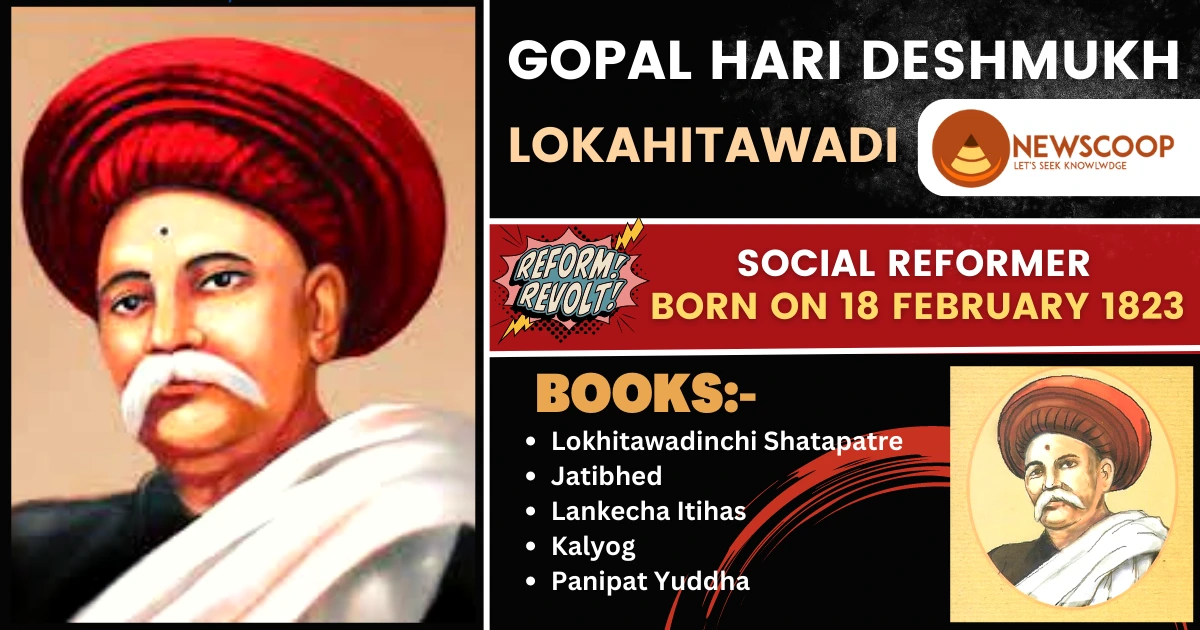Gopal Hari Deshmukh (Lokahitawadi): Social Reformer
India’s struggle for independence was a tumultuous period marked by countless heroes who dedicated their lives to the cause. While names like Mahatma Gandhi, Jawaharlal Nehru, and Subhas Chandra Bose are well-known, there are many unsung heroes who played pivotal roles in the fight for freedom.
One such unsung hero is Gopal Hari Deshmukh, a multifaceted personality whose contributions to the independence movement deserve recognition and remembrance. In this article, we will delve into the life and legacy of Gopal Hari Deshmukh, better known as Lokhitwadi.
Who was Gopal Hari Deshmukh?
Gopal Hari Deshmukh, also known as “Lokahitawadi,” was a prominent Indian writer and social reformer who lived in the 19th century. He was born on 18 February 1823 and passed away on 9 October 1892. Deshmukh was born into a Chitpavan Brahmin family in Maharashtra, India.
Gopal Hari Deshmukh is renowned for his contributions to literature and social reform during a time when India was undergoing significant social and cultural changes. He began his career as a translator for the British government during the British Raj, later serving as a small cause judge in Ahmedabad, Gujarat, and as a Diwan in the Ratlam state.
Books of Gopal Hari Deshmukh
Certainly, here’s a list of books and writings by Gopal Hari Deshmukh:
- Lokhitawadinchi Shatapatre (108 Articles for Social Reform)
- “Svadhyaya Athava Aryavidyancha Krama, Vichar ani Pariksana” (Study of Aryan Learnings, Thought, and Review)
- Jatibhed (Caste Division)
- Lankecha Itihas (History of Lanka)
- “Kalyog” (The Age of Kali)
- “Panipat Yuddha” (The Battle of Panipat)
Philosophy & Beliefs
- Advocated self-sufficiency for individuals and society.
- Promoted Western education as a tool for rational thinking and societal progress.
- Emphasized humanitarianism and social service for the betterment of society.
- Encouraged rational thinking and critical analysis as a means to address societal challenges.
- He expressed his views on religion, politics, economics, social issues, and administration through numerous epistles.
- His criticism of social issues was comprehensive, reflecting his deep love for his homeland, Maharashtra.
- Deshmukh, as an intellectual, lamented the loss of political independence in India.
- He identified eight factors, which he termed “Hindushashtak,” as responsible for India’s loss of independence.
- These factors included ignorance, loss of learning, the dominance of foolish Brahmins, misguided religious notions, fatalism, and blind traditionalism.
Social Reform Initiatives

Gopal Hari Deshmukh, known as “Lokahitawadi,” was a proactive advocate for social reform. Here are more details about his significant social reform initiatives:
1. Initiating Social Reform Articles
At the age of 25, Gopal Hari Deshmukh embarked on his journey as a social reformer by writing articles that challenged prevalent social norms and advocated for positive change. Using the pseudonym “Lokhitawadi,” he used his writings as a platform to address pressing issues within society and suggest ways to bring about improvement.
2. 108 Articles: “Lokhitawadinchi Shatapatre”
Deshmukh’s dedication to social reform led him to write a remarkable series of 108 articles, collectively known as “Lokhitawadinchi Shatapatre.” These articles were a significant contribution to Marathi literature and played a pivotal role in sparking discussions and conversations about social issues that needed attention and change.
The series tackled a wide range of subjects related to societal reforms, shedding light on issues that were often ignored or overlooked.
3. Founding Periodicals
Understanding the importance of spreading his ideals and encouraging public discourse, Deshmukh took the initiative to establish periodicals that could serve as platforms for open dialogue and awareness. Some of the periodicals he founded include:
- Gyan Prakash: This periodical aimed to disseminate knowledge and information to a wider audience, promoting education and rational thinking.
- Indu Prakash: Focused on shedding light on important issues affecting society, Indu Prakash contributed to fostering a sense of social responsibility and awareness among its readers.
- Lokhitwadi: The periodical that shared its name with Deshmukh’s pseudonym, Lokhitwadi, was a testament to his commitment to the welfare of society. It aimed to inspire positive change and engage readers in discussions about social reform.
Through these periodicals, Gopal Hari Deshmukh not only provided a platform for addressing social issues but also nurtured a community of like-minded individuals who were dedicated to driving change and progress within society.
Deshmukh’s Religious Thoughts
Gopal Hari Deshmukh held distinct religious ideas and beliefs that were rooted in rationality and critical thinking:
- Rational Religion: He believed in approaching religion with reason and critical thinking.
- Mind’s Importance: Deshmukh stressed the value of the human mind and independent thought in matters of faith.
- Testing Holy Texts: He thought that claims in religious texts should be examined with logic and practicality.
- Vedic Authors: Deshmukh saw Vedic composers as great saints and writers, not divine beings.
- Caste Origin: He argued that the caste system came from individuals’ characteristics, not divine orders.
- Heroic Avatars: He viewed avatars as heroic figures, not necessarily divine incarnations.
- Critique of Superstitions: Deshmukh criticized superstitions like mantras and astrology.
- Social Reform: He advocated for religious practices to evolve and align with societal progress.
- Positive Spirituality: While critical, he acknowledged religion’s potential as a path to spirituality when practiced positively.
Conclusion
In conclusion, Gopal Hari Deshmukh, known as “Lokahitawadi,” was a remarkable figure in 19th-century India who left a lasting impact on society through his multifaceted contributions.
As a social reformer, he tirelessly advocated for self-sufficiency, rational thinking, and humanitarianism. His rational approach to religion challenged traditional beliefs and practices, emphasizing the importance of reason in matters of faith.
Further, his legacy serves as a testament to the power of ideas and the enduring impact of individuals committed to positive change.
Thank You!

